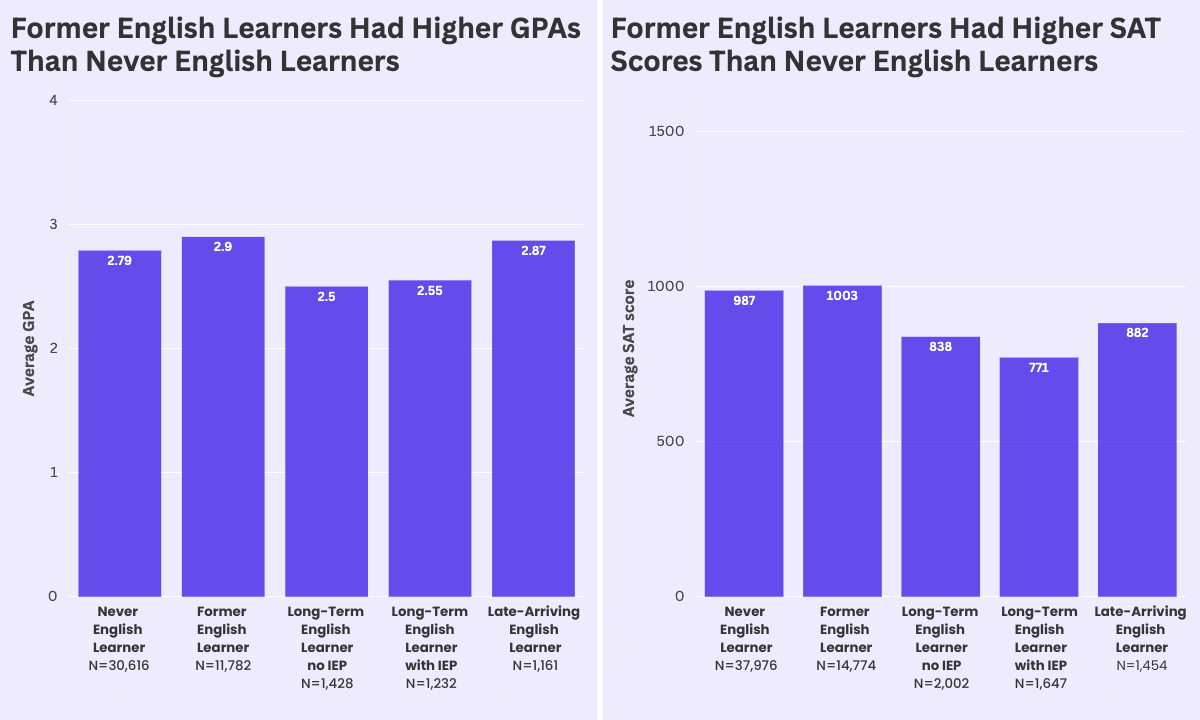Former English Learners in Chicago Public Schools Outdo Peers on GPA, Graduation
New University of Chicago research captures English learners’ otherwise unseen academic success by tracking those who left the program.

Get stories like this delivered straight to your inbox. Sign up for The 74 Newsletter
It’s true: English learners lag their peers by several metrics, a fact some politicians use to deride their growing presence in America’s public schools.
But researchers with The University of Chicago say such data points represent a mere snapshot of student achievement for those still learning a new language, telling just a fraction of a greater story.
They’ve been turning their attention instead to a different group of children: Former English learners who, by the time they reached ninth grade, had graduated from language support programs.
Their recent study of 78,507 Chicago Public School students who started high school in the fall of 2014, 2015 and 2016 shows this group is thriving: They had better cumulative grade point averages and SAT scores and were more likely to graduate high school than the district average.
Their two-year college enrollment rate was also higher.

“There is this perception that English learners are particularly struggling, that they don’t do well … that they are perpetually behind,” said Marisa de la Torre, a managing director and senior research associate at the UChicago Consortium on School Research.
Incoming Vice President JD Vance furthered the notion that these students are a burden, when he pointed to the tens of thousands of school-age children in Michigan whose parents are undocumented.
“Now think about that,” he said in October. “Think about what it does to a poor school teacher, who’s just trying to get by with what they have, just trying to educate their kids, and then you drop in a few dozen kids into that school, many of whom don’t even speak English. Do you think that’s good for the education of American citizens? No, it’s not.”
Xenophobia and race-baiting were central to Donald Trump’s re-election efforts. The incoming president has said he will use the U.S. military to drive millions of undocumented people from the country, a plan already under fire by immigrant advocate groups and economists.
de la Torre said the belief that all children associated with English learner programs are forever adrift is misleading and unfair to students and their teachers: It’s a far smaller subset of active English learners — those who struggle to make it out of English learner support programs — who tend to have lower grades, she said.

Jorge Macias, now a senior consultant to the Latino Policy Forum, led Chicago Public School’s multilingual program for years. He said the narrative must be changed to reflect reality.
“State-level data and national data doesn’t capture this group properly,” Macias said, noting that 78% of English learner students in the Chicago school system transitioned out of the program by 8th grade, according to an earlier study. “And once the students exit, they actually show just as much success — if not more — in the factors that matter most for postsecondary success. “
UChicago researchers divided active English learners into categories, including long-term English learners. These students were in the program for at least six years: Many had learning disabilities and Individualized Education Programs outlining their mandated special education services.
The final category consisted of late-arriving students, those who came to the district after the third grade and remained active in the English learner program in their freshman year of high school.
Former English learners represented 23% of the school system’s ninth graders in the years the study covered. Long-term English learners without IEPs made up 4%. Their performance was substantially lower than the district average.
These students were more likely to enroll in a two-year-college and less likely to enroll in a four-year college — and when they did enroll in a four-year college, they had lower persistence rates., they had lower persistence rates.
Long-term English learners with IEPs made up 3% of ninth graders in the study. Their high school performance and college enrollment and persistence rates were similar to non-English learners with IEPs.
Late-arriving English learners, who also made up 3% of the study’s ninth graders, graduated high school at similar rates to their peers: 81% compared to the district average of 84%. But their college entrance exam scores were lower.
Despite this, their two-year college persistence rate was markedly higher than most other students who enrolled in college.
Researchers found that while late-arriving English learners struggled with standardized tests, their grades were strong. And they were more successful than their native English-speaking peers — and former English learners — in college, suggesting their poor test performance was not predictive of later success.
This new report builds upon earlier research in this area. Another de la Torre study of Chicago Public Schools found that English learners who demonstrated English proficiency by eighth grade had higher attendance levels through elementary and middle school, better math test scores and core course grades compared to students never classified as ELs.
It found, too, that English learners who did not achieve English proficiency by eighth grade struggled with declining attendance by the middle grades and also had considerably lower grade point averages.
Rebecca Vonderlack-Navarro, the Latino Policy Forum’s vice president of education policy and research, said quality bilingual programs and other supports can help active English learners succeed.
The achievements of former English learners, she said, are “a powerful reminder that bilingualism is not a barrier, but a bridge, to greater opportunities.”
Get stories like these delivered straight to your inbox. Sign up for The 74 Newsletter

;)
